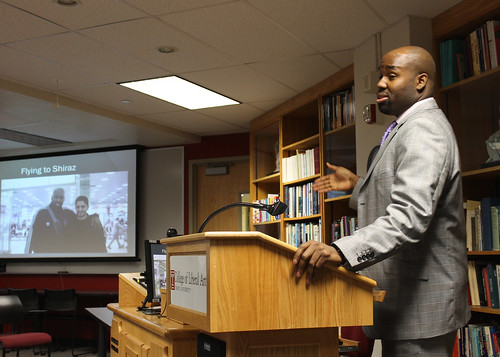
A teach-in examines America’s perception of Iran and its people in the media.
Armond James, a 2008 alumnus, returned to Main Campus Friday, Feb. 10, to pose a question to the Temple community: Do we know the truth about Iran?
James, who studied history at Temple, led Professor Ralph Young’s weekly teach-in, after returning from a trip to the Middle East.
James said he knew after graduating that he wanted to take an independent trip and Iran seemed a natural choice.
“I wanted to go somewhere dangerous, somewhere I shouldn’t go,” James said. “I didn’t care about going outside of my element.”
James’ trip began with a flight to Tehran, and led him all over the Iranian landscape. Historic and domestic sites alike provided insight into how Iranian society functioned, and showed James the discrepancies in the media projected to Americans, he said.
“Once you got [Iranian people] in their element, they were just like any other American, any other human being,” James said, adding that he didn’t experience any of the hostility or negativity that so many Americans would expect.
“They’re intrigued with American culture and society,” James added. “They would say, ‘Make sure you tell people: We love Americans.’”
James said the worldly knowledge of Iranian people impressed him.
“You would be amazed how much Iranians know about American politics, everything we see [on the news] here, they see there,” he said, adding that he was able to watch the GOP primary debates on Iranian television.
Overall, James said the trip helped him see the importance of drawing your own conclusions and experiencing something firsthand before passing judgment.
“There’s a reason behind everything. There [are] two sides to every story,” he said, warning students to be wary of political motivations when it comes to Iran and the negative images in media. “Iran has [its] problems, but they have a right to those problems.”
People in attendance said that they agree with James’ opinion that many people form opinions based off of one-sided media.
“He prompts people to question their own perceptions, and that’s what a higher education experience is all about,” said Luke Trama, a first-year law student. “It opens your eyes to this disconnect between what we believe and what’s actually happening.”
Keshav Patel, a sophomore biology major, agreed with Trama, and said that hearing James’ experience made him question his own opinions.
“I had a negative connotation towards Iran, but the way he opened the door – well, it made me think a little bit,” Patel said. “Before passing judgment, I should do some more research and create an opinion for myself.”
James said he returned from his trip hopeful that someday relations with Iran could be repaired, but stressed that it would be impossible if people, especially college-aged citizens, were unwilling to look at both sides.
“Everyone’s concerned about left or right, pro-this or pro-that. What about being pro-human being? The way to create peace is to break bread, eat and talk. Not American to Iranian, but person to person,” James said. “Be radical, be aggressive. Test your mind, see how far it goes. Here in America, people don’t think outside the box. To me, the box doesn’t even exist.”
Next week’s teach-in, “Temple’s Protest History,” will be held in the Temple Gallery at Tyler School of Art on Feb. 7 at 3 p.m.
Ali Watkins can be reached at ali.watkins@temple.edu.



He’s right.
Why should we judge harshly a country where gays are hung, Jews are not alllowed, women are treated like camel dung, Bahais live in fear, Zoroastrians also live in fear, and let’s not forget Kurds who live in fear too.
Why should we judge harshly a country that openly advocates for the genocide of all Jews in Israel, that supports Hamas AND Hezbollah, whose leader sounds like Hitler only without a German accent.
Silly me for jumping to unfair conclusions about a country like Iran.